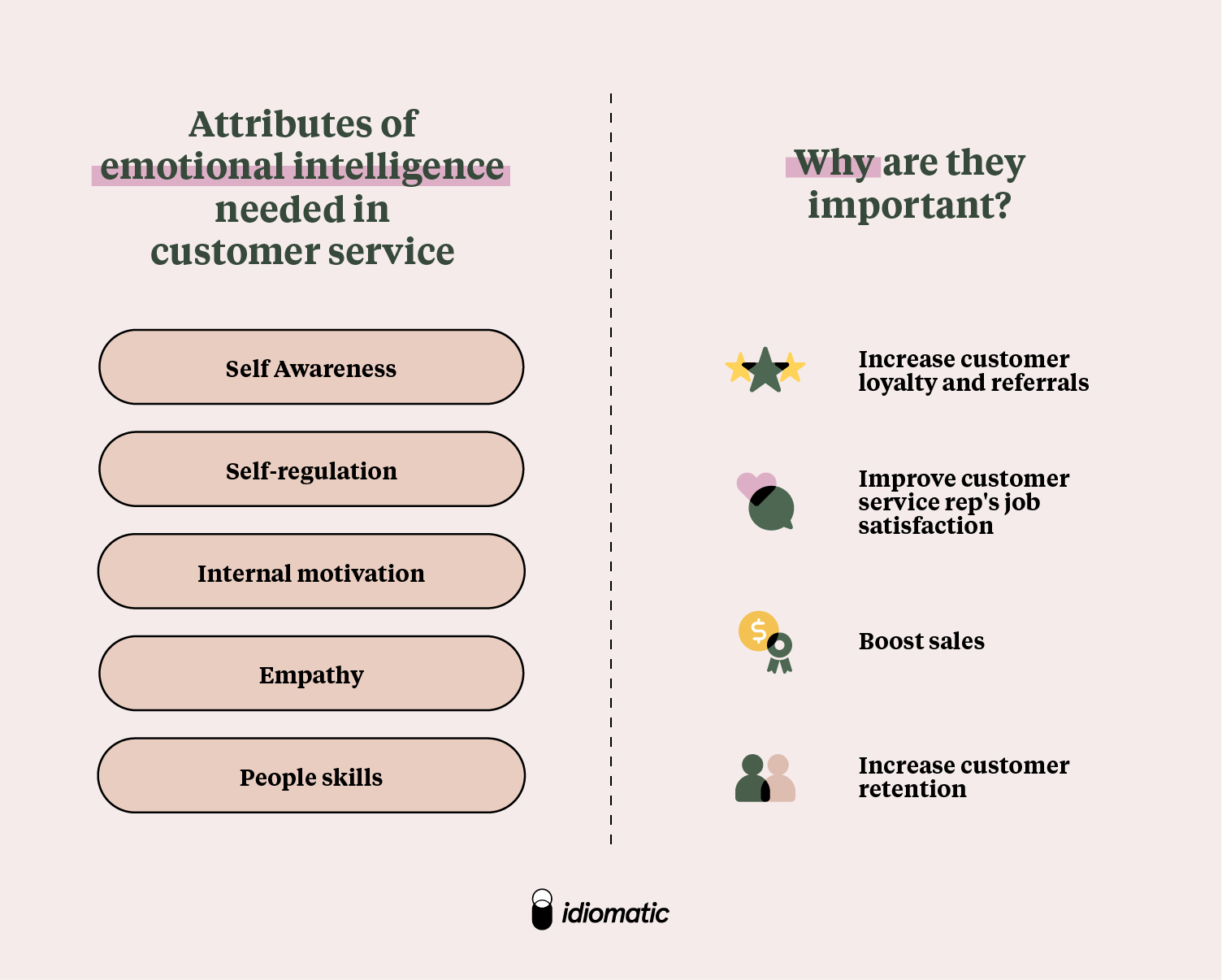Does your company rely solely on numbers and data to measure your customer service team’s growth and success? Data-backed insights are essential, but so is knowing how to improve your data points if they’re not meeting your goals or customer expectations. And sometimes, those improvements aren’t faster ticket resolution or more tickets answered. You can achieve increased customer service success by boosting the emotional intelligence of your customer-facing support teams.
All customer interactions are critical to the perception of your brand. Do your customers feel their conversations and interactions with your customer support teams are authentic, empathetic, and helpful? If not, how can you train your customer support teams to be more mindful of their language, tone, and processes to build and maintain customer trust?
Read on to learn more about emotional intelligence and its place in your customer service teams.
Contents
- What is emotional intelligence?
- Why is emotional intelligence important in customer service interactions?
- How to measure customer service emotional intelligence in your customer service teams
- How to increase emotional intelligence in your customer service team
- Using AI to understand your customer service reps’ emotional intelligence
What is emotional intelligence?
Emotional intelligence is about being aware of our own emotions, understanding the feelings of others, and responding appropriately with empathy. It’s about using skills like self-awareness, self-regulation, internal motivation, empathy, and people skills to communicate with others to recognize and influence their emotions.
For customer support teams, it could mean being a calm voice on the other end of the phone, giving the customer the opportunity to explain without interjecting too quickly, or going above and beyond to provide the customer with a solution to their query. High emotional intelligence for customer service teams means being in calm control of the conversation to better guide the customer towards the best solution.
Emotional intelligence is divided into five categories:
Self-awareness
Self-awareness is recognizing how your speech patterns, word choice, and tone impact others. In customer service interactions, it’s important to be aware of how and what you say to customers to avoid angering them or to help manage an especially irate customer.
Self-regulation
Self-regulation is about how you respond to what someone else is saying. In a customer service interaction, this often involves staying calm, speaking in a non-rushed tone, and adapting quickly and calmly to new situations as they arise during an interaction.
Internal motivation
Internal motivation refers to the attitude you bring to conversations. Those with superb customer service skills know why they’re doing their job, are committed to their own, their employer, and the customer’s happiness, and are generally optimistic about their job.
Empathy
Empathy is about understanding and genuinely responding to the feelings of others to build trust. Customer service teams with empathetic representatives can better address and reverse customer anger through their word choice and tone.
People skills
People skills include a combination of using all the previous four emotional intelligence skills and using them to drive their interactions with others. Through emotional intelligence training and practice, everyone can learn and become positive emotional intelligence representatives of your company brand.

Why is emotional intelligence important in customer service interactions?
Customer service teams with high emotional intelligence often have more positive customer service experience interactions. Ultimately, customer service is about relationship management and solving problems, and there’s a huge emotional component in this for customers.
Emotional intelligence initiatives can have the following benefits for your business:
- Increase customer loyalty and referrals: When your customers have a positive experience with your customer service reps, they’re more likely to stay loyal to your brand and refer you to others. Delighting your customers goes a long way to earning and maintaining loyalty.
- Improve customer service rep’s job satisfaction: When your customer service reps are better equipped with emotional intelligence training, they’re more productive and motivated to do their best to make customers happy. These customer service skills often translate to more consistently positive customer feedback, which further motivates the team.
- Boost sales: When your customer support team is known for having positive customer service skills, you’re more likely to attract new customers and increase sales.
- Increase customer retention: 72% of customers will switch brands after just one bad experience. By ensuring you’re always creating a positive connection, even with rude or demanding customers, your support teams can create positive emotional states and support customer expectations and trust in your brand.
👉 For more tips on improving customer service, beyond boosting the emotional intelligence of your teams, read these tips on fixing bad customer service.
How to measure customer service emotional intelligence in your customer service teams
In business, metrics and measurable results matter. Good emotional intelligence can be measured through:
- Self-reporting, including self-assessments or personality tests.
- Customer surveys, including feedback given by customers after contacting your support team.
- Artificial intelligence and data analysis to understand customer sentiment and satisfaction to see if they’re improving.
How to increase emotional intelligence in your customer service team
Training your customer service team in key emotional intelligence skills requires education and practical experience. Emotional empathy isn’t something everyone has naturally, so it’s important that if this is an area a team member is lacking, you provide them with workshops and ways to practice empathy related to their job. With practice, anyone can excel at the skills needed for high emotional intelligence.
There are many ways to fix bad customer service, but we want to highlight a few related to customer service emotional intelligence. Here are three ways we’ve seen work great for many customer service teams:
Repeating the problem back to the customer
The best way to avoid misinterpretation between customers and employees is to show the customer you understand them by repeating their problem or query. This is an easy way to show the customer you’re listening and understand their problem exactly as they intended.
Acknowledging that the customer has had a bad experience
It doesn’t matter if the customer is contacting you regarding a common or complicated issue. It’s important to verbally acknowledge that you understand their feelings, stress, or point of view. It could be as simple as saying, “I understand how frustrating that is,” then following up with the solution they need.
Use AI-based solutions to provide deeper insights
In addition to boosting your team’s emotional intelligence skills, use an AI-based customer support solution that uses machine learning to truly understand customer pain points from qualitative and quantitative customer feedback data.
An AI customer satisfaction software like Idiomatic can help you unlock the full potential of your customer feedback and conversations by better categorizing customer support tickets and effortlessly routing them based on priority. It provides human quality insights at scale, no matter how quickly you grow. This means no more human errors in tagging or analysis.
For example, your AI might provide insights to help you better route priority tickets to customer service reps with more experience in these types of customers or tickets. It can also analyze customer feedback in real-time so you can address any critical customer service issues right away.
👉 Learn more about how Idiomatic’s AI can help you scale your customer support.
Using AI to understand your customer service reps’ emotional intelligence
Idiomatic harnesses qualitative feedback (from surveys, customer messages, or chats about their experience) and quantitative data (how often similar negative experiences happen). Using machine learning algorithms, Idiomatic takes feedback that might have once been ignored as your team can avoid feedback being arbitrarily ignored as anecdotal, giving you with data-based insights into the emotional intelligence level of your customer support teams.
When you use Idiomatic’s customer intelligence platform, you get actionable insights to better understand which emotional or social skills your team needs to improve (such as self-awareness, self-regulation, internal motivation, empathy, or people skills). This information allows you to plan additional skills testing or training to boost customer satisfaction and brand reputation.
Learn how Idiomatic can help you better understand your customer pain points so you can help boost the emotional intelligence of your customer-facing support teams.




